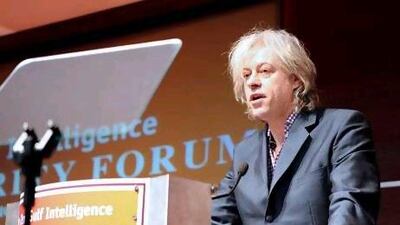ABU DHABI // Sheikh Nahyan bin Mubarak, the Minister of Higher Education and Scientific Research, has rejected a call by Bob Geldof for people to have fewer children to help ensure there is enough food for future generations.
"It's estimated that if 200 million women were given free contraceptives, it could stop 80 million unintended pregnancies," Geldof, the musician and activist, said yesterday at the second Gulf Intelligence Food Security Forum in the capital.
"That would bring world population growth to a halt - which is a start."
He said Arab countries' populations were rising faster than those elsewhere - by an average of 1.7 per cent a year, compared with the global average of 1.2 per cent.
The world population stands at 7billion and is expected to reach 10billion by 2050, requiring a 70 per cent rise in agricultural production.
"The water available here has dropped 75per cent since 1950," said Geldof, who heads the Band Aid Charitable Trust, which helps to relieve poverty in Ethiopia.
"By 2050, that will be cut in half if the population increases. Less water means no crops - so it's a perfect storm."
But with an Emirati population of only 800,000, the message is likely to be a particularly tough one to sell in the UAE.
"It's not entirely clear to me that the way to succeed is to stop having children," said Sheikh Nahyan, also at the forum. "They are the future."
He said it would be better to focus on food production and consumption, as well as energy, water, pollution, deforestation, biodiversity, urbanisation and disease.
Sheikh Nahyan also quoted the UN as saying "we should not ask whether we are too many, but what can we do to make the world better".
"That approach appeals to me because it's the one that the UAE is following," he said. "So we need new ideas and policies."
But Geldof called on the UAE to accept the harsh reality now and avoid disastrous consequences later.
"They either find a cultural way to make this acceptable or they're going to have an anthropogenic critical event," he said.
Global consumption is also expected to increase by 1,600 per cent in the next 90 years.
"I think the tipping point has been reached," Geldof said. "There can't be more people on the Earth than we can feed."
The key, he believes, is in educating women, because when women are educated they have fewer children.
In India and the Philippines the fertility rates, or the number of children for each woman, are 2.8 and 3.3 respectively, while in Thailand and Kerala, which each have a 98 per cent literacy rate, it is only 1.7.
Geldof predicts famine, plague and wars if the population does not stabilise. And although the region has a lower birth rate than others, it could drop further.
"There is certainly more we can do here," said Sean Evers, the managing partner of the communications company Gulf Intelligence.
"But in a relative basis, women's advancement is on the move in the Arab world compared to other large parts such as rural China, parts of Africa and India."
And investing in foreign farmland will only help the UAE so much, Geldof said.
"Water's going to run out first because you need it to produce food," he said.
"Population is about resources, so although the UAE is interested in farming in Africa, it is not enough, even if you have 100 per cent productivity."
Geldof said it was no longer viable to continue with so many people in the world.
"We must see the possibility of life, not just to individual children, but to the human species," he said.
"And I'm not that optimistic."

